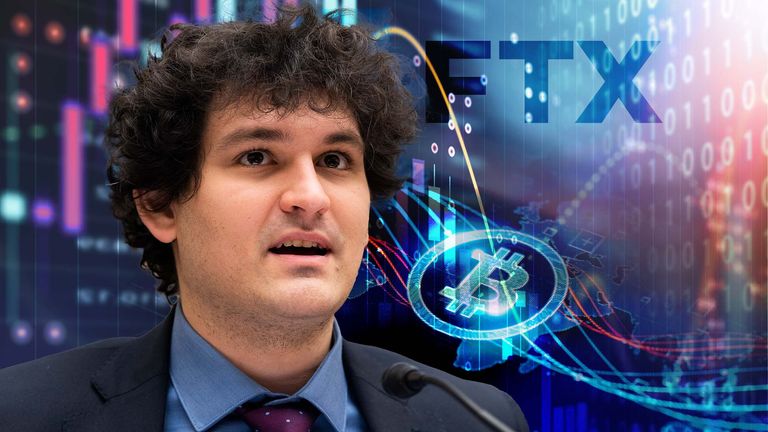As a symbol of the year in crypto, the sight of Sam Bankman-Fried being hustled out of court in Nassau to a blacked-out SUV that would take him to an airfield, and an extradition flight to New York, takes some beating.
For the highest-profile player in cryptocurrency, 2022 has come to an abrupt and unforgiving end.
The man who received celebrities, prime ministers and presidents in shorts and a T-shirt is no longer the quirky nerd whose genius might unlock the potential to earn digital billions.
Instead, he’s the face of a massive fraud, accused of using customers’ money in the crypto exchange FTX to cover his bad bets and fund a Bahamian penthouse lifestyle while he preached a doctrine of altruism, in which his millions were earned in the service of the less fortunate.
Prosecutors revealed on Wednesday that his closest partners in the business, his co-founder and the some-time girlfriend who ran his crypto hedge fund, have turned, pleading guilty to wrongdoing and providing evidence against him.
SBF, as he is sometimes known, has insisted that none of this was intentional, that the siphoning of customer money to his private accounts is a function of incompetence rather than venality.
But with tens of millions of those dollars having been directed to political donations, Washington is as embarrassed as celebrities like Tom Brady – who beamed their endorsements in FTX’s lavish marketing campaigns – and the outlook is bleak.
Was it inevitable?
The question for the crypto industry, and the wider field of digital assets, is whether FTX’s collapse is an inevitable symptom of a sector that, in promising to magic value out of the electronic ether, has always been short on trust and credibility, and fertile ground for corruption.
Or is SBF, as his successor as chief executive of FTX alleges, simply an old-fashioned embezzler whose alleged crimes were sophisticated only in the way they were hidden in plain view? And if so, do digital assets have a future not forever mired in wild volatility of questionable assets, sudden collapses, and cons?
It had already been a chastening year with a series of summer collapses, of crypto lender Celsius and the Terra-Luna network, a scandal with its own fugitive from justice, Do Kwon, subject of an arrest warrant in South Korea, and an Interpol red notice.

These collapses wiped out billions, and a 75% slump in the value of the original cryptocurrency Bitcoin took a few more, much of it from retail investors whose willingness to exchange real money for digital ciphers is the fuel that keeps the crypto machine running.
Frances Coppola, an economist and noted crypto-sceptic, says these episodes are a consequence of the fundamentally unsound nature of the products, hastened by the wider economic climate in which cheap money is no longer available to top up the punchbowl.
“In the time crypto’s been in existence it has promised much and delivered very little, except a lot of bubbles which have then spectacularly burst,” she says. “We are now in our third major bursting of a crypto bubble in its short timeframe and it’s not at all clear when or if it will recover from this.
“I think FTX and the rest, Terra, Luna, Celsius, are a phenomenon of the crypto bubble that we’ve seen in the last two years. It’s not greatly surprising that it all came to grief when the Fed [US Federal Reserve] started to tighten monetary policy along with other central banks, and the withdrawal from the global economy of all the money that had been pumped in during the pandemic.”
Please use Chrome browser for a more accessible video player
Wild volatility part of Crypto’s appeal
The wild volatility that has been so costly this year appears to be a fundamental part of crypto’s appeal. Speculation and the ability to massively leverage bets by borrowing from exchanges feels like it has more in common with gambling than an investment, a retail version of the wild derivatives trading exposed to public view at horrible cost in 2008.
That has not stopped mainstream investors from taking a greater interest in crypto. Some of the biggest venture capital funds in America lost money in FTX, and banks are responding to demand from institutional investors unwilling to leave an estimated trillion dollars in new digital assets on the table.
Waqar Chaudry, of Standard Chartered bank, told me the next two years will be pivotal for mainstream engagement with digital finance: “We believe digital assets are here to stay for the long term. The primary job for a bank is to provide services to the clients where they need it.
Click to subscribe to the Sky News Daily wherever you get your podcasts
“From an institutional banking point of view, there is demand where large institutions are moving into cryptocurrencies. So where they are moving into that world they need service providers who have pedigree in financial services, and they are talking to us about what their plans are and what they look like for the next 12 to 24 months.”
The corporate world meanwhile is looking hard at the technology that lies beneath. These ‘distributed digital ledgers’, in which watertight cryptography and a public network of scrutineers replacing a clearing house or intermediary, have long appeared to have transformational potential.
For years blockchain has seemed like an answer awaiting the right question, but numerous routes are becoming clear.

The economy of things
Philip Skipper, Vodafone’s head of technology for the internet of things, says they are crucial to the next step in digital living, ‘the economy of things’.
“We already have devices that you can communicate with. The economy of things is when these devices communicate and transact with each other.
“So you can be driving down the road and your electric car could be communicating with a traffic light, you can be buying access to a congestion charge for the next 50 yards. It’s the ability of these devices to connect and transact together. That is the economy of things. Underpinning that is how you link all those plays together and that’s where blockchain has the key role.”
Global supply chains, so disrupted by COVID, could be transformed by the technology too. The combination of blockchain and stable digital currency opens the door to smart money, which could link payments to quality and delivery at each stage of a production process.

The flip side of this notion is state-controlled money which limits a citizen’s ability to spend as and when they choose. Imagine welfare payments paid only in approved digital coins that would only unlock for approved products.
The potential of these technologies for good and ill makes the role of regulators and government central, as well as the importance of public debate about what exactly we want from our money.
That absence of regulation is a common theme to the catastrophic failures in crypto this year. Ironically for a technology that promised to bypass mainstream institutions, they will be central to shaping the future of crypto and blockchain.


No Comments Yet